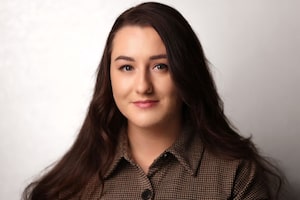Prabjot Singh Wirring, a prospective lawyer, is seen outside the Edmonton Law Courts in Edmonton on June 24.Megan Albu/The Globe and Mail
A prospective lawyer in Edmonton is suing the provincial government and Law Society of Alberta for requiring him to swear an oath to the Queen to practise law, arguing that the rule violates his religious freedoms as a Sikh.
Prabjot Singh Wirring said doing so would compromise his faith and identity because he has already made an absolute oath to Akal Purakh, the divine being in Sikh tradition, as an Amritdhari (initiated) Sikh. Earlier this month, he filed a legal challenge against both bodies and seeks to provide an alternative oath, or be exempt, to be admitted to the bar.
Other provinces and territories in Canada, such as British Columbia and the Yukon, allow people with religious or conscientious objections to provide a different oath to practise law. In Alberta, individuals must swear to “be faithful and bear true allegiance to Her Majesty Queen Elizabeth II, her heirs and successors” under provincial legislation.
Mr. Wirring said the requirement has brought to the surface feelings of anger, frustration and sadness. He said it adds to experiences of racism and exclusion felt throughout his life and alienates him from his peers.
“Even when you are included in a certain space, or you’re around a table, I still have to explain and justify my existence. I don’t get to just be, like other people in the room,” Mr. Wirring said. “When we talk about inclusion, diversity and things like that, you have to acknowledge the burden that racialized people carry already. As a part of any calculation, you have to determine, which battles do I need to fight or have the energy to fight?”
Compromising his principles at the outset of his legal career would be counterintuitive, he said, and go against the values that form who he is as a person and soon-to-be lawyer. Mr. Wirring said his entire life has been shaped by his religion and inspired his commitment to social justice.
He said he reached out to executives of the Law Society of Alberta, a self-governing body that sets standards for lawyers, before pursuing legal action. Although they were sympathetic to his situation, he said they were unable to provide an accommodation because the oath falls under provincial legislation.
Elizabeth Osler, executive director of the law society, reiterated in a statement to The Globe and Mail that the society does not have the authority to change the legislation governing the oath requirement. She declined to comment on whether it would like to see changes to the law.
The Government of Alberta declined to comment as the matter is before the courts.
Mr. Wirring graduated from the Schulich School of Law at Dalhousie University and is set to complete his articling requirements this August. He will then be eligible to be admitted to the law society. If a solution can not be found, he said his only option will be to uproot his family to another province, severing connections with his extended family and spiritual community.
In 2020, the society acknowledged systemic discrimination in Alberta’s legal profession and made a commitment to foster a more equitable and inclusive environment through a range of initiatives. The Alberta government has also made a broad commitment to address racism and remove barriers in its public-service work force.
Avnish Nanda, an Edmonton-based lawyer representing the plaintiff, said this lawsuit highlights the need to do more.
“This is a situation where the law society and the province have to reflect on if their conduct matches their words when it comes to creating a more inclusive, equitable and diverse legal profession, [one] that actually reflects the population it serves,” Mr. Nanda said. “If you have these archaic barriers, you’re going to prevent people like my client from practising law.”
The statement of claim states the oath of allegiance breaches Mr. Wirring’s Charter entitlement to freedom of religion and discriminates against him based on his race and religion as it precludes him from practising law. Mr. Nanda said the government has yet to submit statements of defence.
Dr. Harjeet Grewal, a professor at the University of Calgary who is an expert on the Sikh religion, said in a sworn affidavit the implications of the Khande ki Pahul ceremony, in which one formally becomes a member of the Khalsa (initiated Sikh community), forbid someone from pledging allegiance elsewhere.
“For a member of the Khalsa, pledging allegiance to any other entity, living or dead, would be tantamount to reneging on the vows already made,” Dr. Grewal said. “Once the individual has entered the Khalsa they are not able to commit themselves or make abiding pledges upon any other figure or entity as it would excommunicate them from the Khalsa.”
We have a weekly Western Canada newsletter written by our B.C. and Alberta bureau chiefs, providing a comprehensive package of the news you need to know about the region and its place in the issues facing Canada. Sign up today.
 Alanna Smith
Alanna Smith